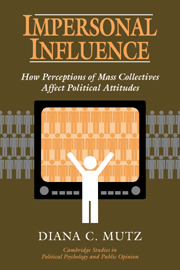Book contents
- Frontmatter
- Contents
- List of Figures
- List of Tables
- Preface
- Acknowledgments
- Part I Theory and Historical Context
- Part II Effects of Perceptions of Mass Experience
- 4 The Politicization of Personal and Collective Experience
- 5 Connecting the Personal and the Political: Media as Facilitator or Inhibitor?
- Part III Effects of Perceptions of Mass Opinion
- Part IV Conclusion
- Appendix: Methodology
- References
- Index
4 - The Politicization of Personal and Collective Experience
Published online by Cambridge University Press: 05 June 2012
- Frontmatter
- Contents
- List of Figures
- List of Tables
- Preface
- Acknowledgments
- Part I Theory and Historical Context
- Part II Effects of Perceptions of Mass Experience
- 4 The Politicization of Personal and Collective Experience
- 5 Connecting the Personal and the Political: Media as Facilitator or Inhibitor?
- Part III Effects of Perceptions of Mass Opinion
- Part IV Conclusion
- Appendix: Methodology
- References
- Index
Summary
Reading in a newspaper that the unemployment rate has increased by a few percentage points seems a fundamentally different experience from receiving a pink slip indicating that one has lost a job. Losing a job has an inescapable impact on an individual's everyday life; on the other hand, reading about unemployment in a newspaper appears to have greater consequences for American political life. In the economic realm, it is now a well-known finding that perceptions of collective economic experience generally play a more important role in shaping political attitudes than personal economic experiences do. A large body of findings has accumulated showing that political attitudes and behaviors are rarely affected by the economy's impact on individual lives and fortunes (Kinder and Kiewiet 1981; Eulau and Lewis-Beck 1985). For example, contrary to expectations, recent personal experiences with unemployment have virtually no effect on vote choice (Schlozman and Verba 1979). Similarly, changes in family finances have little impact on voting or evaluations of incumbents (Kiewiet 1983; Kinder, Adams, and Gronke 1989). This same pattern extends to policy attitudes as well. As Kinder (1983) concluded, “Neither losing a job, nor deteriorating family financial conditions, nor pessimism about the family's economic future has much to do with support for policies designed to alleviate personal economic distress” (p. 403).
Despite continuously disappointing findings, self-interest rooted in personal life experience seems such a compelling basis for political behavior that this hypothesis has spawned a huge number of studies (Sears and Funk 1990).
- Type
- Chapter
- Information
- Impersonal InfluenceHow Perceptions of Mass Collectives Affect Political Attitudes, pp. 99 - 145Publisher: Cambridge University PressPrint publication year: 1998



